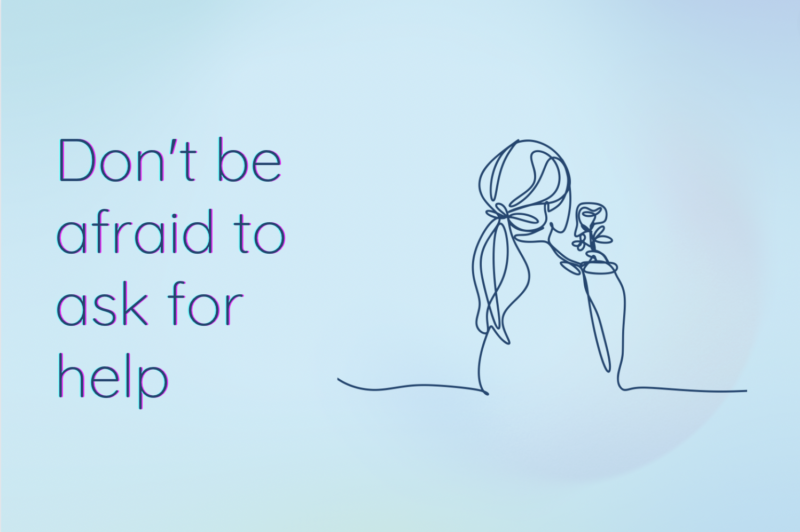Don’t Be Afraid to Ask for Help
By Roamers Therapy | May 2023
For many people, the concept of an adult has taken on a meaning that may be damaging to our mental health. The term adult seems to have become synonymous with “having your life together” or succeeding in isolation from others. This interpretation of the meaning of adulthood leads us to feel like we have failed if we find ourselves needing help. Holding on to this definition of adulthood can worsen feelings of anxiety, loneliness, and worthlessness. When we do not allow ourselves to admit that we need help we place unnecessary pressure on ourselves that can be detrimental to our mental and physical wellbeing.
There is nothing wrong with asking for and accepting help. Let’s think of different stages of life. When transitioning from middle school to high school, or high school to college , there is typically some form of an orientation. There may be a training period when starting a new job, and time off for new parents. The purpose of these adjustments and training is to offer support through transitioning into a completely new experience. Adulthood is also a new experience although it is not a single transition. There are so many experiences that may be experienced with adulthood (marriage, financial responsibility, etc.) and existing experiences as an adult do not necessarily prepare you for new ones. There is no manual that we can just follow, the range and variety of experience is almost infinite, yet the destructive expectation is to handle it all on your own. In reality, asking for and accepting help is necessary and expected in adulthood. It is not a sign of failure, but may rather be a sign of healthy boundaries and self-care practices.
Another fear that may arise in regards to asking for help is feeling like we are a burden and like we are asking for too much. In truth, many of us would instantly help those we love and care about if it were within our capacity, be it friends, family, or partners. Yet, we are unable to trust that others would willingly do the same for us. When this type of thinking arises, notice it and remind yourself that it is just a story that your mind is telling you and it’s not necessarily accurate.
Try to think of the different ways your loved ones have shown you that they care about you and focus on that. Use this knowledge as a source of strength to reach out for help. If you feel comfortable, you can also check in with a loved one about their availability to provide support. You do not have to go through life alone. The beauty of life lies in being able to share it with people we love and care about. We thrive in connection, in relying on one another and working out how to do life together. This includes times of change, difficulties and periods of uncertainty. Reflect on who you can reach out to for support and utilize those connections.
At Roamers Therapy, our psychotherapists are here to support you through anxiety, depression, trauma and relationship issues, race-ethnicity issues, LGBTQIA+ issues, ADHD, Autism, or any challenges you encounter. Our psychotherapists are trained in Cognitive Behavioral Therapy, Dialectical Behavioral Therapy, Psychodynamic Therapy, Acceptance, and Commitment Therapy, Person-Centered Therapy, and Gottman Therapy.
Whether you’re seeking guidance on a specific issue or need help navigating difficult emotions, we’re ready to assist you every step of the way.
Contact us today to learn more about our services and schedule a session with our mental health professionals to begin your healing journey. To get started with therapy, visit our booking page.
First, decide if you’ll be paying out-of-pocket or using insurance. If you’re a self-pay client, you can book directly through the “Book Now” page or fill out the “Self-Pay/Out-of-network Inquiry Form.” If you’re using insurance, fill out the “Insurance Verification Form” to receive details about your costs and availability. Please let us know your preferred therapist. If your preferred therapist isn’t available, you can join the waitlist by emailing us. Once your appointment is confirmed, you’ll receive intake documents to complete before your first session.
This page is also part of the Roamers Therapy Glossary; a collection of mental-health related definitions that are written by our therapists.
While our offices are currently located at the South Loop neighborhood of Downtown Chicago and Lakeview on Chicago’s North Side, Illinois, we also welcome and serve clients for online therapy from anywhere in Illinois and Washington, D.C. Clients from the Chicagoland area may choose in-office or online therapy and usually commute from surrounding areas such as River North, West Loop, Gold Coast, Old Town, Lincoln Park, Rogers Park, Logan Square, Pilsen, Bridgeport, Little Village, Bronzeville, South Shore, Hyde Park, Back of the Yards, Wicker Park, Bucktown and many more. You can visit our contact page to access detailed information on our office location.

